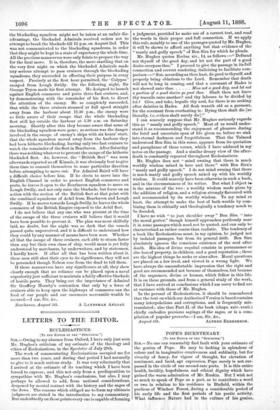LETTERS TO THE EDITOR.
ECCLESIASTICUS.
[To THE EDITOR OF THE "SPECTATOR."]
SIR,—Owing to my absence from Oxford, I have only just seen Mr. Hughes's criticism of my estimate of the theology and ethics of Ecclesiasticus, in the Spectator of July 29th.
The work of commentating Ecclesiasticus occupied me for more than two years, and during that period I had naturally to give to it much serious study. It was very reluctantly that I arrived at the estimate of its teaching which I have been forced to express ; and this not only from a predisposition to sympathise with Mr. Hughes's conclusions, but also, I may perhaps be allowed to add, from national considerations, deepened by mental contact with the history and the sages of the Jews. The reasons which obliged me to form my ultimate judgment are stated in the introduction to my commentary. But undoubtedly on these points every one is capable of forming
a judgment, provided he make use of a correct text, and read the words in their proper and full connection. If we apply this rule, notably to one of the passages quoted by Mr. Hughes, it will be shown to afford anything but that evidence of the " manly and godly speech" of Ben Sira for which he pleads. Mr. Hughes quotes Ecclus. xiv., 14, as follows :—" Defraud not thyself of the good day, and let not the part of a good desire overpass thee." I proceed to give the passage in its full connection and correct rendering, italicising to facilitate com- parison :—" Son, according as thou hest, do good to thyself, and properly bring oblations to the Lord. Remember that death will not be long in coming, and that a covenant of Hades is
not shewed unto thee Miss not a good day, and let not a portion of a good desire go past thee. Shalt thou not leave thy travails unto another? and thy labours to be divided by lot ? Give, and take, beguile thy soul, for there is no seeking after dainties in Hades. All flesh waxeth old as a garment, for the covenant from everlasting is : Dying thou shalt die [so• literally, i.e.,=thou shalt surely die]."
I can scarcely suppose that Mr. Hughes seriously regards this as " manly and godly speech." Most of us would under- stand it as recommending the enjoyment of pleasure during the brief and uncertain span of life given us, before we sink into eternal darkness and forgetfulness. That the Talmud understood Ben Sira in this sense, appears from its quotation and paraphrase of these verses, which I have adduced in my- notes on the passage. And a similar dreary view of the after- death is constantly repeated throughout Ecclesiasticus.
Mr. Hughes does not " mind owning that there is much worldly wisdom mixed in here and there" with Ben Sira's " manly and godly speech." I do not mind owning that there is much manly and godly speech mixed up with his worldly wisdom. It could scarcely have been otherwise in such a book, and in the circumstances of its writer. But what I object to• is the mixture of the two : a worldly wisdom made pions by the addition of religion, and a religion strongly flavoured with and recommended by its worldly wisdom. To my mind at least, the attempt to make the best of both worlds by com- bining them is ethically and theologically a tendency much to be dreaded, I have no wish " to just shoulder away" Ben Sira " into the moral gutter," though himself approaches perilously near- it in some passages which need not be quoted, and can only be• characterised as rather coarse than realistic. The tendency of a book like Ecclesiasticus must, in my opinion, be judged not by isolated passages, but from its general drift. Ben Sira absolutely ignores the conscious existence of the soul after death. His idea of divine requital consists in permanence or else loss of property, in children, and a good reputation ; these are the highest things he seeks or aims after. Moral questions are placed on a low level, and viewed in a wrong light. We have always the uncomfortable impression that the right and good are recommended not because of themselves, but because of the sequences, divine or human, which follow in this life. It is on these grounds, and from a general study of the work, that I have arrived at conclusions which I am sorry to find are at variance with those of Mr. Hughes.
In the perusal of Ecclesiasticus, it should be remembered that the text on which our Authorised Version is based contains.
many interpolations and corruptions, and is frequently mis- translated; also that Part II. of the book (chaps. xxiv.-xxxii.) chiefly embodies previous sayings of the sages, or is a com- pilation of popular proverbs.—I am, Sir, &c.,


































 Previous page
Previous page